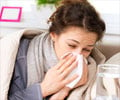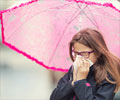In Delhi in the last three months, a new sub-type of the influenza virus H3N2 has been in wide circulation. Experts warn against the use of antibiotics.

‘During weather transitions, asthmatic patients must be extra cautious as it can trigger severe respiratory issues and asthma attacks.
’





"A sudden increase in the number of patients having symptoms of cough, nausea, vomiting, sore throat fever, body ache and diarrhea in some cases," the IMA wrote on Twitter. "While fever goes away at the end of three days, coughs can persist for three weeks," it added, advising doctors to avoid prescribing antibiotics to such patients.
Influenza A Subtype H3N2 Explodes In India
Further, the IMA said that the cases are typically seen in people over the age of 50 and below 15. Some are also reporting upper respiratory infection along with fever. "Air pollution" is also a precipitating factor.It advised medical practitioners to give only symptomatic treatment as there is no need for antibiotics.
The IMA pointed out that people have started taking antibiotics like Athreycin and Amoxiclav etc without caring for dose and frequency and they stop once they start feeling better. They added that "this needs to be stopped as it leads to antibiotic resistance."
"Whenever there will be a real use of antibiotics, they will not work due to the resistance," the IMA wrote.
Advertisement
Harshal R. Salve, Professor at the Centre for Community Medicine, AIIMS, said the increase in the transmission of flu virus is due to abrupt "climatic conditions currently prevalent".
Advertisement
Doctors from Primus Hospital, Chanakyapuri, noted that patients with asthma, and those with severe lung infections are finding difficulty in breathing.
Elderly people, children and pregnant women are most vulnerable to getting infected. Therefore, they must remain extra cautious while venturing outside, the doctors said.
Source-IANS















